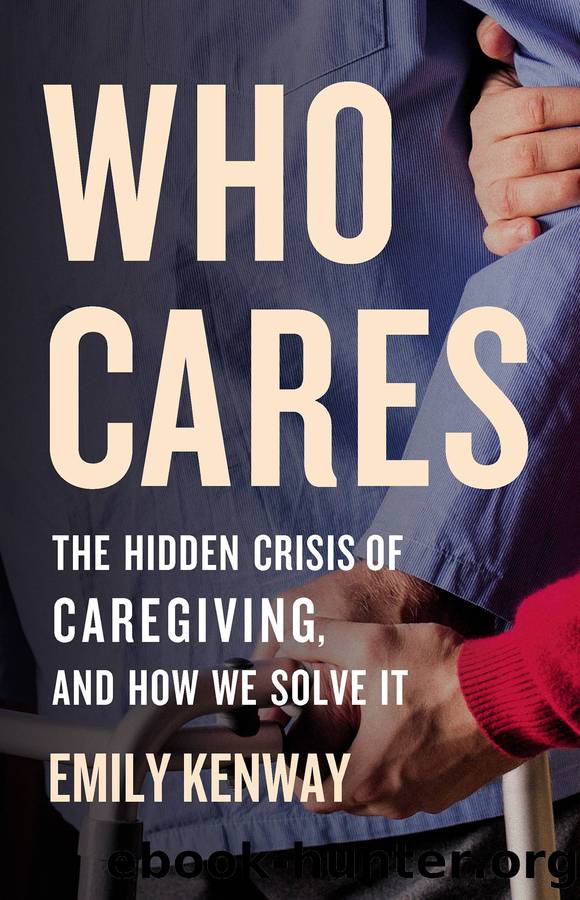Who Cares: The Hidden Crisis of Caregiving, and How We Solve It by Emily Kenway

Author:Emily Kenway [Kenway, Emily]
Language: eng
Format: epub
Publisher: Seal Press
Published: 2023-05-09T00:00:00+00:00
When I was in the throes of caregiving, I noticed how people would look uncomfortable or flinch if I raised the topic, how theyâd make a sympathetic face followed by flapping gestures, as if they were waving it away, seemingly for my benefit. One of the most common responses was âI couldnât do that.â Iâve wondered what they meant. I donât think itâs literal. If their mother was huddled in bed, quivering and coughing, unable to make herself meals or move without their support, they wouldnât just walk away and leave her there to die. They mean that they donât want to do that, and that by believing that we, the caregivers, are somehow superhuman and different from them, theyâll be spared that Herculean labor. It was always delivered as if it was a compliment, obscuring its motivation to keep caregiving at a safe distance. On group support calls with other caregivers, I heard repeatedly how they felt excluded and abandoned by former friends, how neighbors seemed to hurry away from them as if they were infectious. Line, in Norway, tells me that having Tarjei meant âwe learned which friends to rely on and which friends think itâs a nuisance that we are too much work and not flexible enough.â Katy, in England, describes herself as having a âtypical carerâs story: Iâve lost some friends because I wasnât able to go to things and then they just stopped asking. It would still be nice to be asked, even though we both know Iâll have to say no. You lose friends.â
Safa (not her real name) is eighteen and lives in East London. Since she was twelve, sheâs been helping to care for her little sister who has Ehlers-Danlos syndrome, which affects the connective tissue throughout the body, and also Potocki-Lupski syndrome, which Safa describes as meaning sheâs âchild-minded.â We met in a park café in torrential rain, huddling over hot drinks and hoping we could hear each other over the din of the other customers, the whole park seeking cover simultaneously. When I asked about her friendships, she told me that âsome friends were understanding, others werenât so understanding.â She made a chopping motion as she said that she cut the latter group off. Theyâd make spiteful remarks about her sister, and at first Safa argued with them, but after a while she decided it wasnât worth the energy. Evidently, the loss of friends and peopleâs urge to back away from caregiving situations was an experience common to us all. The reason why lies in our evolution.
Evolutionary psychology seeks to understand our behavior by considering what function its aspects may have served in our successful adaptation over time. At its worst, evolutionary psychology can be considered a reductive approach, trying to explain everything in biological terms with, presumably, little room to change things that are so deeply and fundamentally ingrained. At its best, its speculations about why this or that psychological response might have evolved recognizes that while responses may have been functional in the past, that doesnât mean they remain so.
Download
This site does not store any files on its server. We only index and link to content provided by other sites. Please contact the content providers to delete copyright contents if any and email us, we'll remove relevant links or contents immediately.
1610396766 (N) by Jo Ann Jenkins(1301)
Elizabeth Is Missing by Emma Healey(1234)
McGraw-Hill Nurses Drug Handbook by Patricia Schull(1190)
Economics and Financial Management for Nurses and Nurse Leaders, Third Edition by Susan J. Penner RN MN MPA DrPH CNL(1177)
Cherry Ames Boxed Set, Books 1 - 4 by Helen Wells(1155)
The Language of Kindness by Christie Watson(1120)
NCLEX-RN Prep Plus 2019 by Kaplan Nursing(1103)
Cherry Ames, Student Nurse by Helen Wells(1102)
Spiritual Midwifery by Ina May Gaskin(1083)
Whoever Tells the Best Story Wins: How to Use Your Own Stories to Communicate with Power and Impact by Annette Simmons(1060)
Cherry Ames Boxed Set, Books 5 - 8 by Helen Wells(1055)
Home. by Sarah Graham(1052)
Cracking the Nursing Interview by Jim Keogh(1027)
1476763445 by Liz Fenton(1007)
Dementia by June Andrews(931)
Getting Started with Arduino by Massimo Banzi(925)
Cherry Ames, Army Nurse by Helen Wells(901)
Shadows of the Workhouse: The Drama of Life in Postwar London by Jennifer Worth(892)
Children's Medicines by Edward A. Bell(890)
